
|
Astronomy Picture Of the Day (APOD)
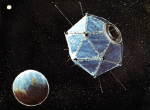 Vela Satellites: The Watchers
Vela Satellites: The Watchers
5.11.1995
In October of 1963 the US Air Force launched the first in a series of satellites inspired by a recently signed nuclear test ban treaty. Signatories of this treaty agreed not to test nuclear devices in the atmosphere or in space.
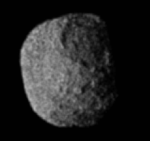 Neptune's Moon Proteus
Neptune's Moon Proteus
4.11.1995
Proteus is the second largest moon of Neptune behind the mysterious Triton. Proteus was discovered only in 1982 by the Voyager 2 spacecraft. This is unusual since Neptune has a smaller moon - Nereid - which was discovered 33 years earlier from Earth.
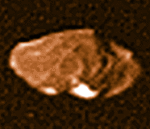 Jupiter's Moon Amalthea
Jupiter's Moon Amalthea
3.11.1995
Amalthea is Jupiter's fifth largest moon, much smaller than the four Galilean satellites Io, Europa, Ganymede, and Callisto. The orbit of Amalthea is inside of these moons, and with its long axis always pointing toward Jupiter. It's dark surface color is probably due to sulfur being expelled from Io.
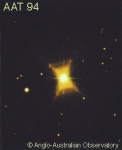 The Red Rectangle
The Red Rectangle
2.11.1995
The unusual geometry of this stellar nebula creates somewhat of a mystery. At the nebula's center is a young binary star system that probably created the nebula, but how? This type of nebula shows a "bipolar flow" which carries a significant amount of mass away from the central stars.
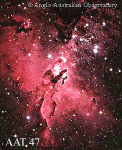 M16: Dust and an Open Cluster
M16: Dust and an Open Cluster
1.11.1995
The photogenic M16 shown above is composed of a young star cluster and a spectacular emission nebulae lined with distinct regions of interstellar dust. Most of the stars in the cluster can be seen offset just above and to the right of the photograph's center.
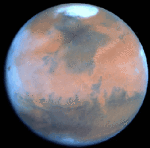 A Halloween Invasion from Mars
A Halloween Invasion from Mars
31.10.1995
Orson Welles became an instant legend on Halloween in 1938 for his radio dramatization of H.G. Wells' "War of the Worlds". Some listeners who did not realize it was a theatrical production were driven to near panic by this fictional account of invaders from Mars.
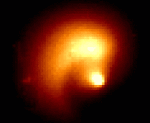 Comet Hale-Bopp Update
Comet Hale-Bopp Update
30.10.1995
Will comet Hale-Bopp become the brightest comet of the Century in early 1997? Since its discovery in July this year, Hale-Bopp has caused much speculation. Even though it is still beyond the orbit of Jupiter it is astonishingly bright and expected to get much brighter as it plunges inward, toward the Sun.
29.10.1995
When massive stars explode they create large radioactive blast clouds which expand into interstellar space. As the radioactive elements decay, they produce gamma-rays. Possible locations of these stellar explosions known as supernovae, are indicated by the bright clumps in this map of the central regions of our Milky Way Galaxy.
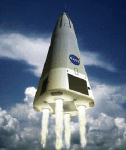 The Delta Clipper
The Delta Clipper
28.10.1995
The Delta Clipper experimental rocket or DC-X is intended as a development vehicle to pave the way for a reusable single stage to orbit rocket. Shown here, in an artists conception, it has made...
 The Tarantula and the Supernova
The Tarantula and the Supernova
27.10.1995
In this close-up of the Large Magellanic Cloud, the spidery looking nebula on the left is fittingly known as as the Tarantula nebula. It is an emission nebula surrounding a cluster of hot, young stars called the 30 Doradus super cluster.
|
January February March April May June July August September October November |
|||||||||||||||||||||||||||||||||||||||||||||||||